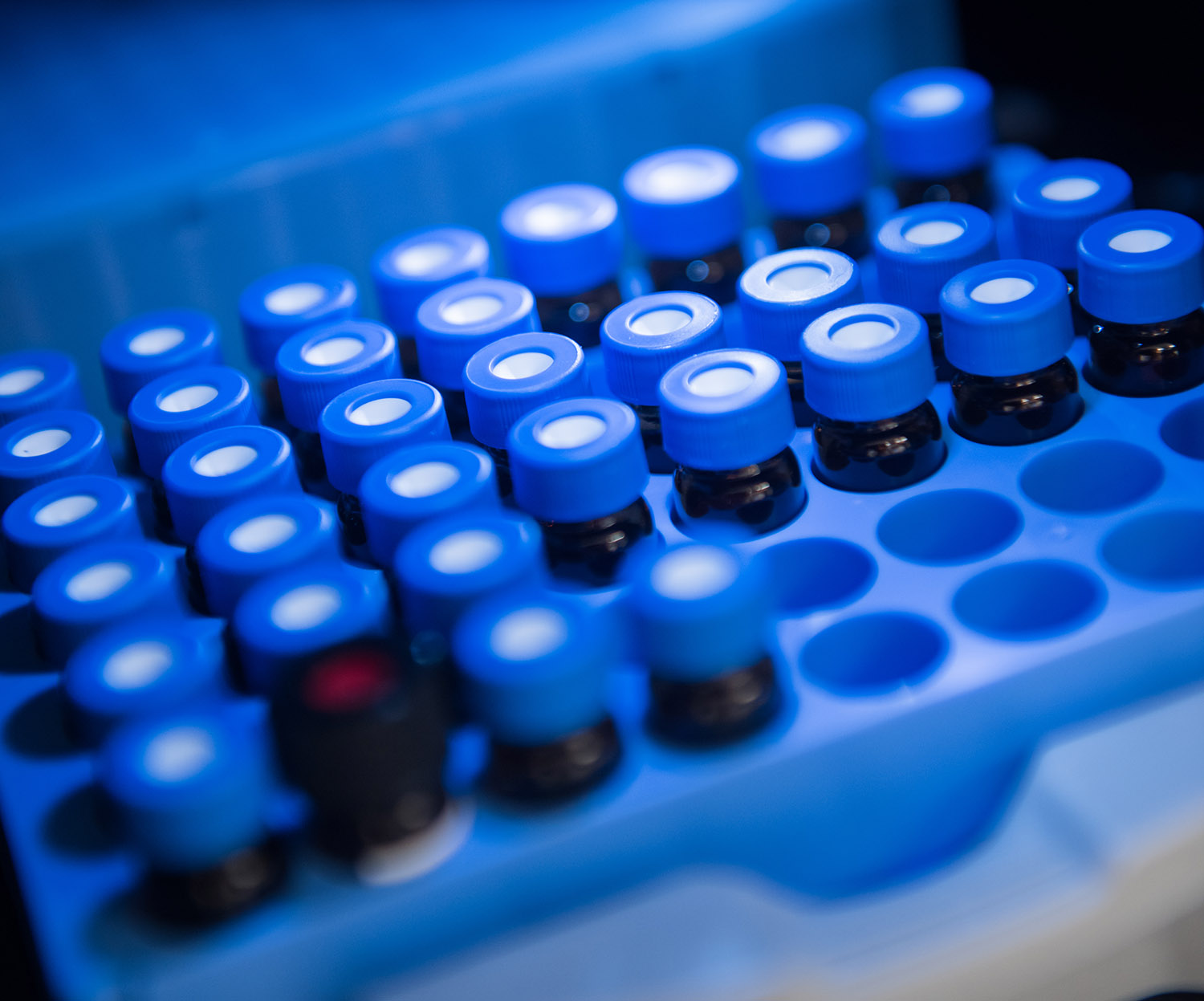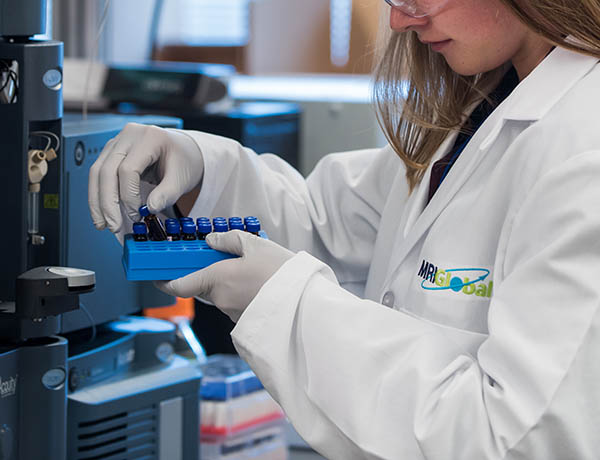FDA Clearance Consultants at MRIGlobal
MRIGlobal is here to act as your Food and Drug Administration (FDA) clearance consultant, helping navigate design control and the multiple regulatory pathways.
As an independent, not-for-profit, contract research organization, we specialize in human health, pharmaceutical sciences, in-vitro diagnostics, defense, energy, agriculture, and global health. Our teams are solution-driven, dedicated to finding answers that will make our country and our world safer.
Learn more about how we support analytical verification and clinical validation studies for diagnostic regulatory submissions; identify and qualify testing sites; gather needed data; and submit the package for FDA clearance.
Clinical studies for diagnostic submissions
MRIGlobal has two reference lab testing sites for your diagnostic studies. Both sites are perfect for FDA multi-site reproducibility studies, which require three geographically distinct testing sites. Clients get the convenience of having only one point of contact, rather than contracting out with multiple testing site providers. Our sites are CLIA (Clinical Laboratory Improvement Amendments)-certified, high complexity labs equipped for a vast array of testing.
Expert consultants for 510(k) submissions
In a traditional 510(k) submission, or premarket notification, your goal is to demonstrate that the device is safe and effective so you can market it. You are trying to show “Substantial Equivalence” to an already legally marketed device.
Your diagnostic results will be compared to something established, a predicate device, that already has FDA clearance. We can perform these method comparison studies in our labs.
Why is it called a 510(k)? It refers to the section 510(k) of the Federal Food, Drug and Cosmetic Act. When is a 510(k) required? There are usually three scenarios in which you’ll need to perform a premarket notification.
The first situation is the introduction of a new device entering the market for the first time. The manufacture of such devices could be foreign or domestic. Another situation would be changing the indications or labeling of a previously cleared device. A third reason might be making significant modifications to a previously cleared device.
MRIGlobal’s expertise will ensure any safe device is able to demonstrate “Substantial Equivalence.”
Special factors for De Novo devices
When a device has no legally marketed devices of a similar type, but for which general and special controls are able to provide a reasonable assurance of safety and effectiveness, it’s classified by the FDA as a De Novo device. Though these devices have no “predicate” test, MRIGlobal has extensive experience leading projects for De Novo devices. There is a lot more creativity involved with finding the appropriate comparisons that will provide those reasonable assurances.
For example, we may find comparisons of results in clinical presentation of patients or a pathology report. Our group of experts makes the process simple for you by condensing a vast amount of experience with De Novo submissions and 510(k) submissions in general.
The process of designing a clinical study
Our team is experienced in obtaining FDA clearance for diagnostic tests. We’ve been through the process many times, so we know the ins and outs and can guide both government and commercial clients.
There is some nuance about how many subjects you need to enroll, or how many sites you need to test when designing a clinical study. For example, a device may have use scenarios in both a professional and over-the-counter (at home) setting. Such a study may need to be designed to obtain data from both of those end user groups and use environments.
The FDA may give guidance on their expectations, but they spell out the logistics of how to get the data from those different user populations. That’s where MRIGlobal’s expertise matters. We can work with clients to develop a protocol stating how we will design a study that will accomplish those goals. How do we do it? We have a lot of experience.
Related: MRIGlobal to Develop CRISPR-based Diagnostics for DARPA’s DIGET Program
Pre-submission for FDA clearance
Everything starts with an FDA pre-submission. This formal process is to solicit feedback from (most often) the FDA to make sure the studies being proposed will sufficiently meet their standards. This pre-submission phase is vital, because without it you could end up spending a lot of money on studies that the FDA won’t accept for clearance.
Work with our team to put together a pre-submission package for the FDA, to which they will provide written feedback. This is a regimented process, and it takes about three months to receive feedback. At that point, we can request any face-to-face meetings we may need for clarification on their points or to discuss anything further.
A pre-submission can change the entire regulatory pathway a study must go through. For example, you can go into things expecting to secure an at-home claim for your device, only to receive FDA’s advice that it would be better to go after a clinical or professional setting.

Effective communication with the FDA
Deft maneuvering through the process of pre-submissions to the FDA requires thinking like both a lawyer and a scientist. Our job at MRIGlobal is to keep you from feeling intimidated by the breadth of the regulations that must be followed. Our role is to navigate the process and help our clients understand what questions they should be asking, what they should be thinking about, and more.
Example of FDA recommendations
To better illustrate what MRIGlobal is navigating through, here’s a sample from the FDA Recommendations for Dual 510(k) and CLIA Waiver by Application Studies.
V. General Study Design Considerations
When designing comparison and reproducibility studies to support a Dual Submission, FDA recommends that applicants evaluate test performance in settings designed to replicate, as closely as possible, the actual CLIA-waived settings, patients/samples, and test operators. Therefore, study designs should include the following:
-
- Testing sites that are representative of the intended use of the waived test
- Subject populations that are representative of the intended patient population(s)
- Intended sample type and matrix
- Untrained operators representative of those at intended waived settings (We encourage you to enroll operators with the least amount of training that might be encountered at the types of sites for which this device is intended.)
-
- Testing should be integrated into the daily workflow of the site where the operators are often multitasking between patient care, testing, and other duties.
General study design considerations for CLIA waiver studies are provided in Section V of FDA’s guidance Recommendations for Clinical Laboratory Improvement Amendments of 1988 (CLIA) Waiver Applications for Manufacturers of In Vitro Diagnostic Devices.
We recommend that manufacturers consider the general recommendations in Sections V.B, V.C, and specific recommendations in Section V for Option 4 studies (i.e., comparison studies in which the results of the candidate test in the hands of untrained operators are directly compared to the results of an appropriate comparative method in the hands of trained operators) when designing studies in support of a Dual Submission.
Importance of Institutional Review Boards
Institutional Review Boards, or IRBs, are third party reviewers that assure protection of the rights and welfare of human subjects. MRIGlobal has an in-house IRB that is registered, maintains a Federalwide Assurance (FWA) filed with Office for Human Research Protections (OHRP) and in compliance with all necessary regulations.
FDA regulations define an IRB as a formally designated group intended to review and monitor biomedical research involving human subjects. An IRB has authority to approve, require modifications in, or disapprove research. The purpose of institutional review boards is to assure steps are taken to protect human rights and welfare when they participate as subjects in research.
There is a group process to review research protocols and related materials, such as informed consent documents, to ensure the rights and welfare of the human subjects are protected.
Not only does MRIGlobal have an in-house IRB for this process, we are experienced in the types of research protocols and documents that will ensure the safety of human subjects and secure approval from the IRB.
Analytical studies support
For studies that require contriving of samples to generate specific data for FDA, we can do the necessary analytical studies as well. We are able to completely support a suite of analytical studies in-house. We have multiple BSL2 and BSL3 labs, and experience with a wide variety of human viral, bacterial, fungal, and parasitic pathogens.
After the analytical studies, we can help you set up and perform the clinical study and submit it to the FDA for clearance. If you want less of a hands-on approach, we are flexible with each project.
Develop your diagnostic product or design your studies with MRIGlobal
We are here for all of your diagnostic needs. Our CLIA-certified high complexity labs can perform reference testing. We can serve as a beta site to gather usability feedback on a device or software that is being tested, and we can help with research and development. If you have a high level idea but lack the technical expertise, we can bring your idea to fruition.
Whether you’re submitting to the FDA or to regulatory agencies around the world, we can support you. From the biggest names in diagnostics to startups, we see your diagnostic through the process of being submitted for clearance.

